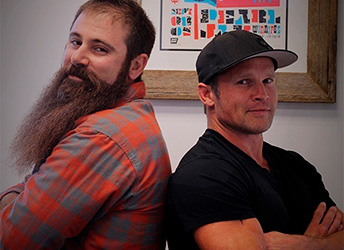
Understanding that the best move you can make, may be your exit.
For the last 5 years, I have been the CEO of Gravity Jack, a creative custom software design and development agency. Last month, I stood in front of every employee I have at Gravity Jack — and I fired myself.
I founded Gravity Jack in 2009 as a small custom software shop. Since then, it has grown into one of the most sought after digital agencies in the United States, on the front lines of some of the most exciting and cutting-edge research and development happening right now. Our portfolio is full of major brands and even the US Department of Defense, we’ve just opened two additional offices in Chicago and Denver, and this year has already claimed the record of highest revenue ever. Things are great, with no signs of slowing down so, naturally, after presenting our quarterly ‘state of the union’ report and sharing this unprecedented success with our team — I did the most sensible thing I could. I fired myself.
On the surface, it makes no sense. Why on earth would a serial entrepreneur CEO step away from the title in a multi-million dollar company when the revenue is skyrocketing, team morale is at its highest, turnover is virtually null, our board is tickled pink, we are schlepping off debt (hundreds of thousands at a time), customers are raving and forecasts predict it to get even better?
Sensible answers may include, “I want more time with my family” or “I wanted to leave it in a good spot” — or even the humbling, “there are health issues that make me unfit to lead.” In truth, I’ve never heard a story that asks the one, true question that should drive us all as CEOs. “What is best for the business?”
As CEO of Gravity Jack (which is somewhere around my 8th stint in a CEO/owner role), I received some early wisdom from one of my mentors. He told me, “build the business so it can use you but doesn’t require you. Always hire for a position better than the person in that position.”
This advice is daunting when you start to break it down, and requires tons of planning in advance — especially when the position is my own.
Before making the announcement to a room full of my employees, I shared the following quote, from Nadav Shoval, CEO and cofounder of Spot.IM:
“An entrepreneur is an engine for change; they are single-minded in breaking boundaries, bursting through doors, and disrupting industries. A CEO is engaged in building the kind of company that will be around long enough to one day be disrupted itself…An entrepreneur can galvanize friends and family to help in a crisis, a CEO has to motivate and manage a team of people, day in and day out.”
I’m an entrepreneur — a cowboy, shooting from the hip, and this year I came to a very clear realization: A CEO needs to be the sheriff. He still packs his six-shooter, but he takes the time to aim.
Part of my firing included the announcement of who would be my successor. The story of Gravity Jack’s new CEO, Josh (“Trout”) Abel, starts almost 20 years ago. I was a far younger entrepreneur, with the wisdom of a young man. I thought I knew it all. I was doing well with a software shareware product that provided income flow every week. I had a hardware business in the height of the white box boom that brought in over 10 million dollars a year, and an even younger warehouse manager named Josh.
Josh was a workhorse. At 19 years old, he was a machine and kept return levels at $35,000. The warehouse was spotless; orders were fulfilled on time and correctly. In short, I didn’t know what I had: A person like myself who, above all else, liked to the do the job right. Josh was a real person too — one who deeply loved fly-fishing. His puppy, Fly, would grace the warehouse daily. Through our work together, Trout and I became friends.
Before long, destiny (and my ego) took over one day, when he asked me for a meeting regarding pay. He had prepared a spreadsheet with his five-year goals. They were aligned with necessary pay upgrades over the coming five years. The pay raise was for $2.00 an hour. I laugh now that I was so blinded but I said no and, in one fell swoop, managed to completely devalue this amazing employee. I was ignorant to the fact that I had an individual who envisioned himself still invested in my company, five years down the road. Not to mention, at the age of 19, was proactively planning that far in advance.
He gracefully provided me with his 30-day notice. Shortly after, I learned that $250,000 in revolving returns is extremely uncomfortable in comparison to $35,000. I learned that the level of stale inventory in the ‘dot com’ bust could very quickly make you go bust. I learned to look at the person, rather than the request and, perhaps most importantly, I learned that ego could sink you.
After nearly a decade, Trout and I started to connect again. I had grown as a person and Trout had grown into an extremely astute businessman. He was in tech, so conversation came easy. His successes are many, but his humility is even greater. Everything he touches is successful, and his tenacity is inspiring. It is a quiet and kind tenacity that is more like a vice grip than the teeth of a bulldog. Once it’s locked, it’s not going anywhere.
I had the opportunity to act as a mentor to Trout. As time progressed, he would come through Spokane on his way to fish and we would always make sure to connect. As Gravity Jack grew and changed, we discussed our industries and I was always impressed with his insight. I learned that a great mentor allows himself to also be mentored by the experience. A mutual growth. Iron sharpens iron.
At Gravity Jack, our hiring process begins with our values list. Everyone on the team has to have certain key values. Then, we build a role and responsibilities list. We look at the personality type and additional values that the perfect person in a role would have. Then, we interview for an individual’s personality and capability to fulfill the role we’ve defined.
In 2013, I built a values, role and responsibilities list for a COO, and consistently lamented to my board about the need. I had not realized it yet, but the list I created looked extremely similar to the list for an ideal CEO. Without knowing, I had proven the company’s unique need for a better CEO than me.
While this is happening, Trout and I are having continued conversations about a startup raise he was in the middle of. One February morning, sitting in my office, it hit me like bolt of lightning (something I’ve actually experienced). I stood up and paced my office. In an instant, the next five years played in my head. I just had to get him on board. It would involve a move, agreement of my board, alignment of finances and the culture of my team. I knew, in a moment, where the goal was but it was daunting. What was best for the company would involve me hiring someone — to take my job.
There was a great deal to figure out. Trout met with me and I handed him the role and values list. I already was aware of where he was strong, and where he wasn’t, but he walked me through it. The next step was the board — and his wife. The board wasn’t as convinced, but I knew that, with time, they would see what I knew was true. His wife agreed and, during the course of the next few months, he began interfacing with the team and packing for Spokane. The team loved him and, eventually, I shared with him my plan for his leadership of the company. I described a conservative timeline and planted the seed. I knew that if he was not on board, he would be honest and say so but, instead, he began orienting his actions toward our mission.
Today, we are a year into the plan, and ahead of schedule. The numbers speak for themselves:
The first quarter of revenue this year doubled last year’s, and it’s growing consistently. We’ve paid off nearly $1 million in debt and funding over just the last few months. Raises have been implemented across the board for every single member on our team, and the roadmap for 2016 is extremely exciting.
The proof is already clear. I selected someone better fit than I for this task. The announcement, while extremely exciting (thanks to the success he has already created), was not easy and brought me to tears. Our team is incredibly tight knit. I have placed my team’s future in someone else’s hands. Very capable ones.
Will I still lead? Everyone at Gravity Jack is a leader. Will I follow Trout? Yes. By remaining humble and asking the difficult question of, “Am I what is best for this company?” I have given my team what it deserves and have freed myself to focus on the areas that I am truly gifted in. I get to shoot from the hip and help create vision, knowing that I am led by the wisdom and caution of a CEO. One who will, at times, confidently ask me to holster my six shooter, and at others, fire away with me.
I have always had a deep love for Gravity Jack, as well as who Trout is as a businessman, mentor, mentee and friend. I regret that I failed as his leader and friend decades ago. The growth and trust that it has created (and the confidence it creates for the future) is something that simply cannot be bought.
So there it is. This past month, I fired myself as the CEO of my extremely successful company and, for some of you, urge you to do the same. If you’re reading this, let go of the fear this question creates. Read the quote from Nadav, above, and ask yourself: Ego aside, “What is truly best for this business?” If it’s not you, fire yourself.
Are you an entrepreneur or a CEO?
The answer just might be what your team has needed all along.







